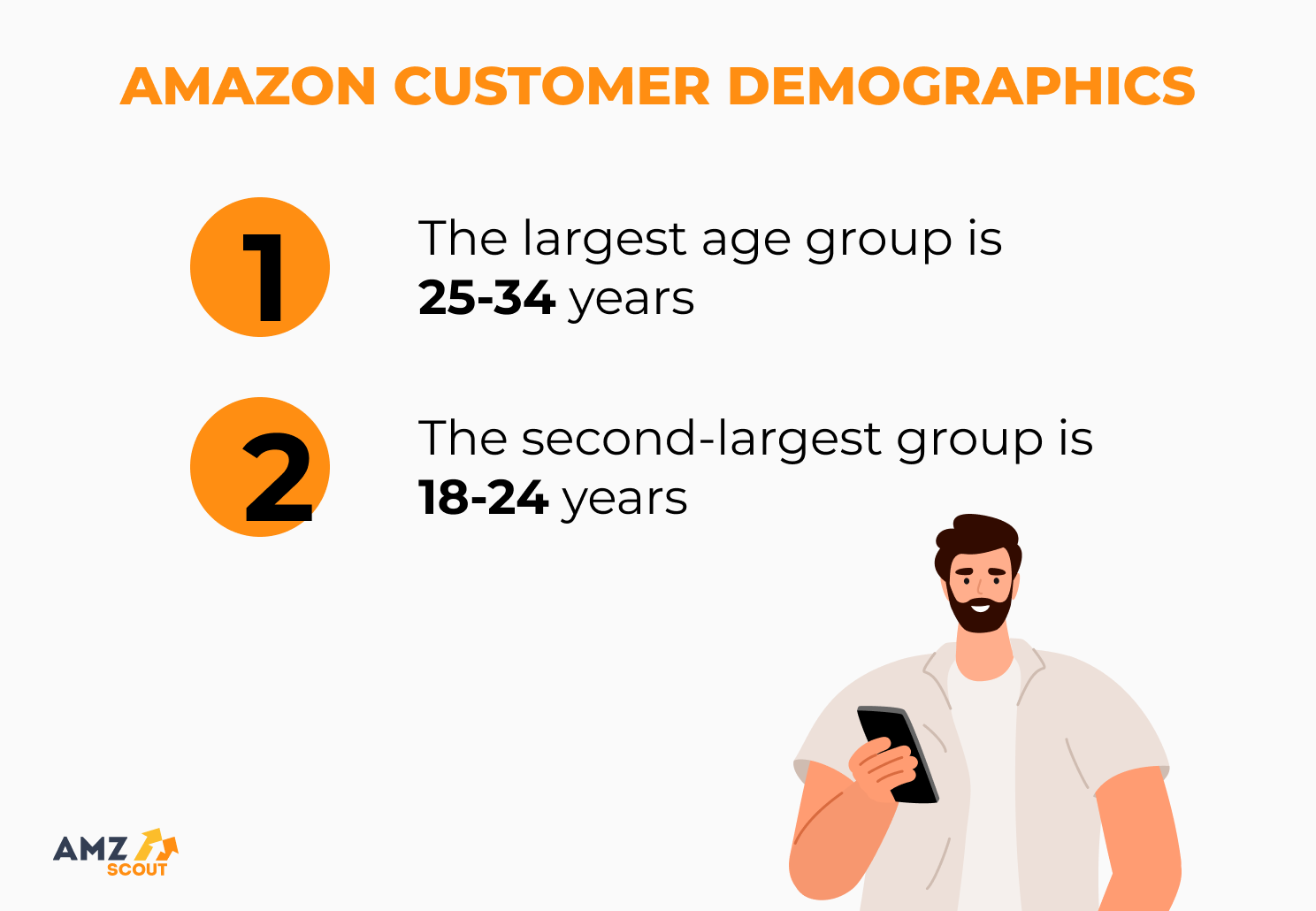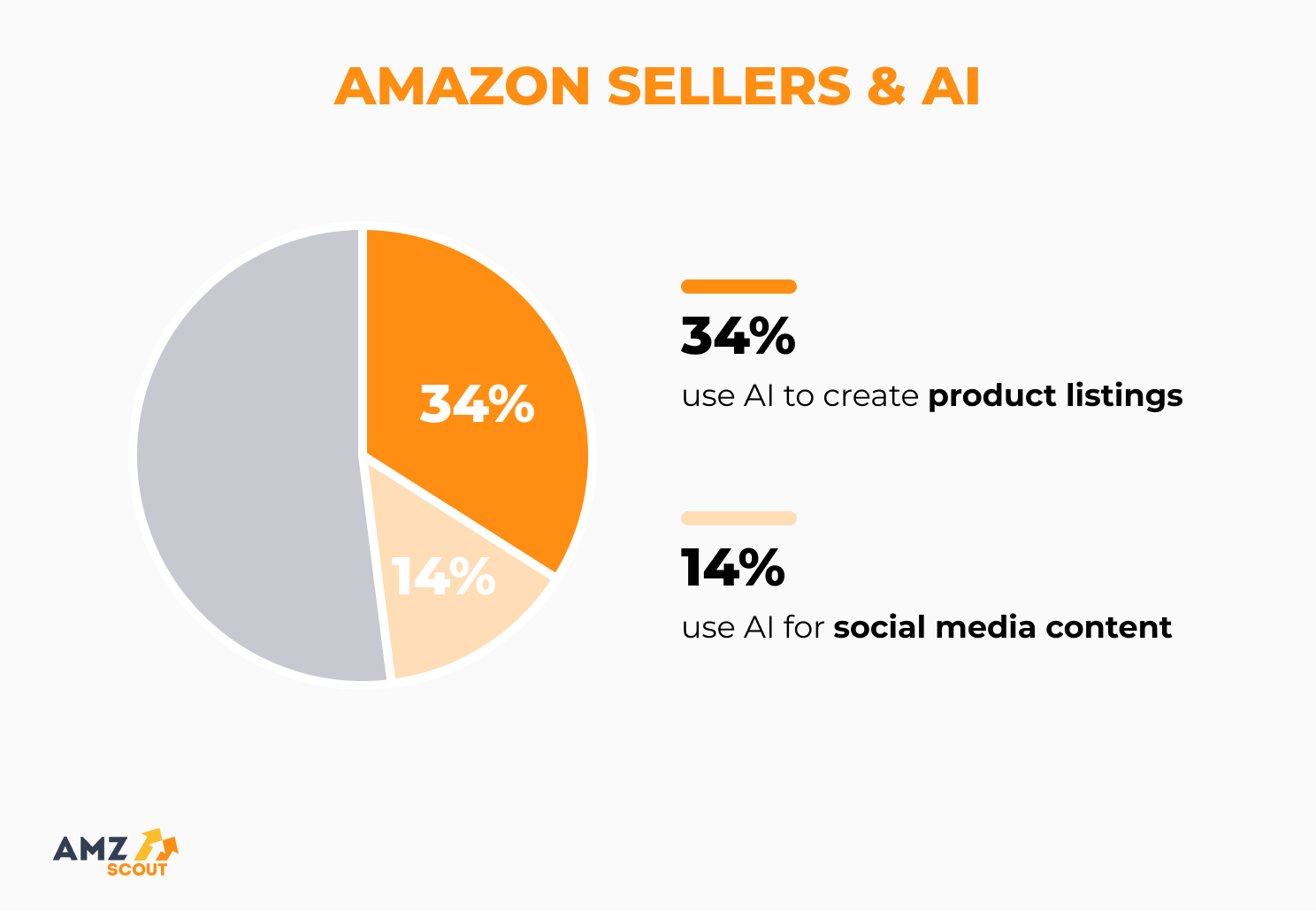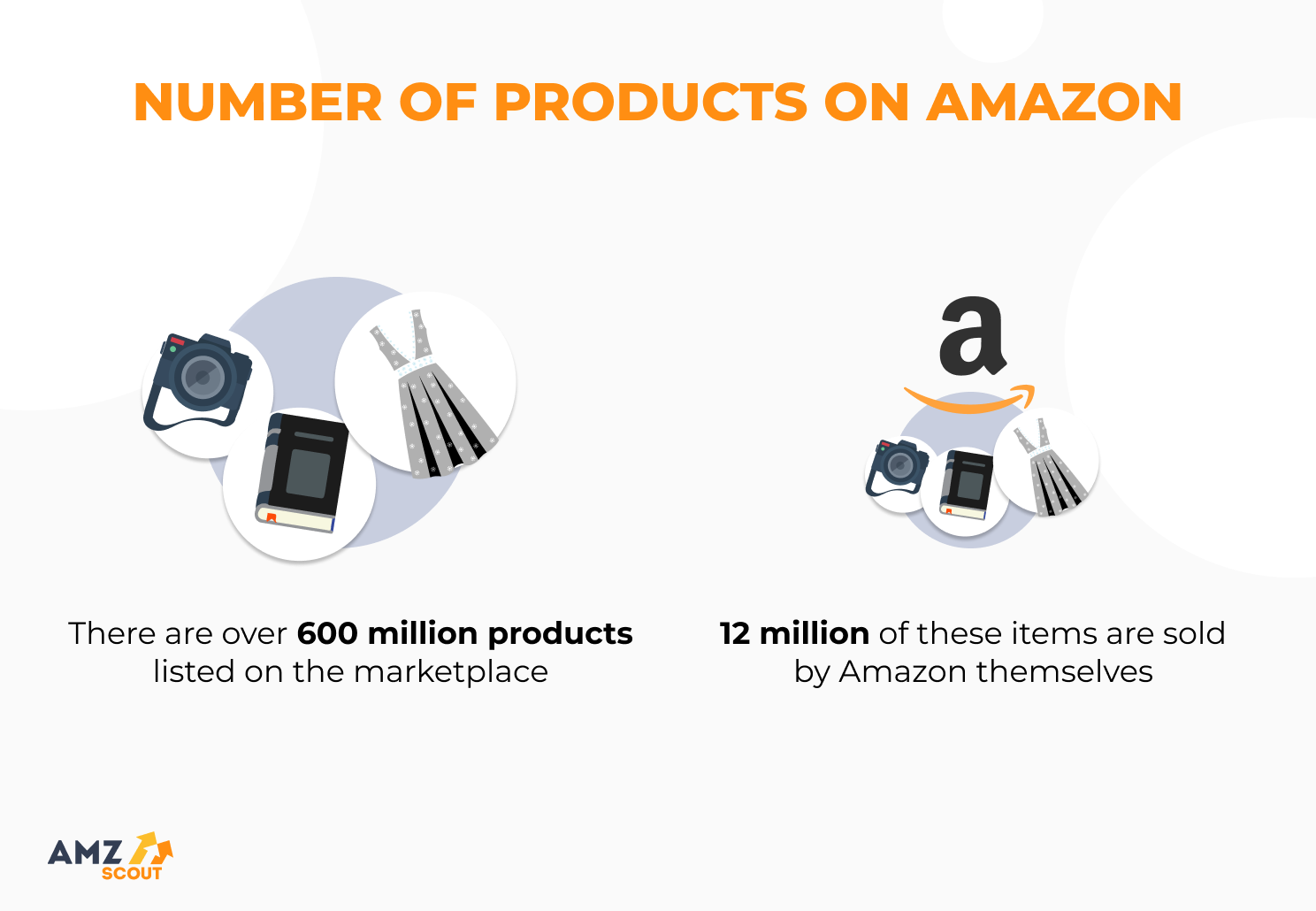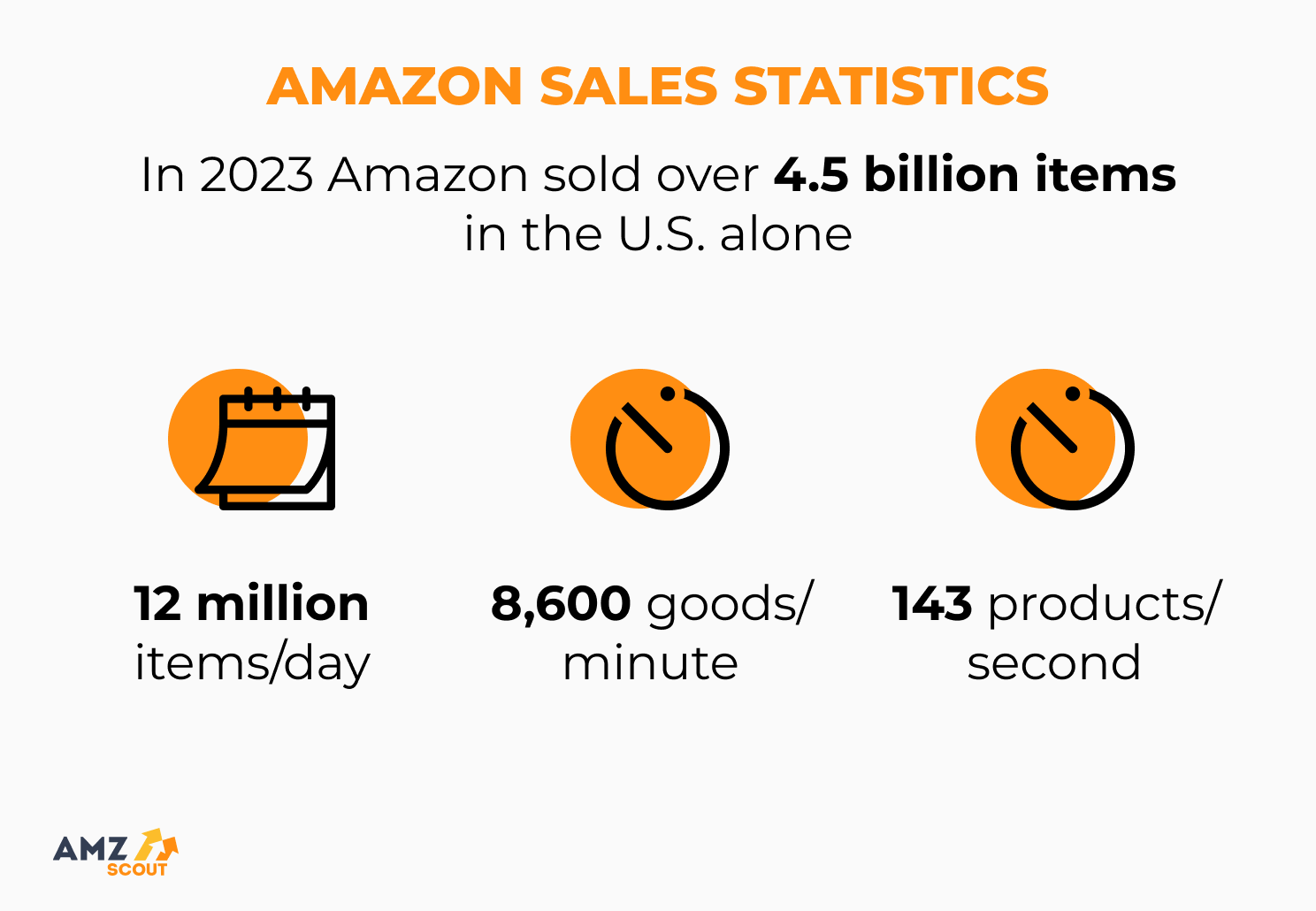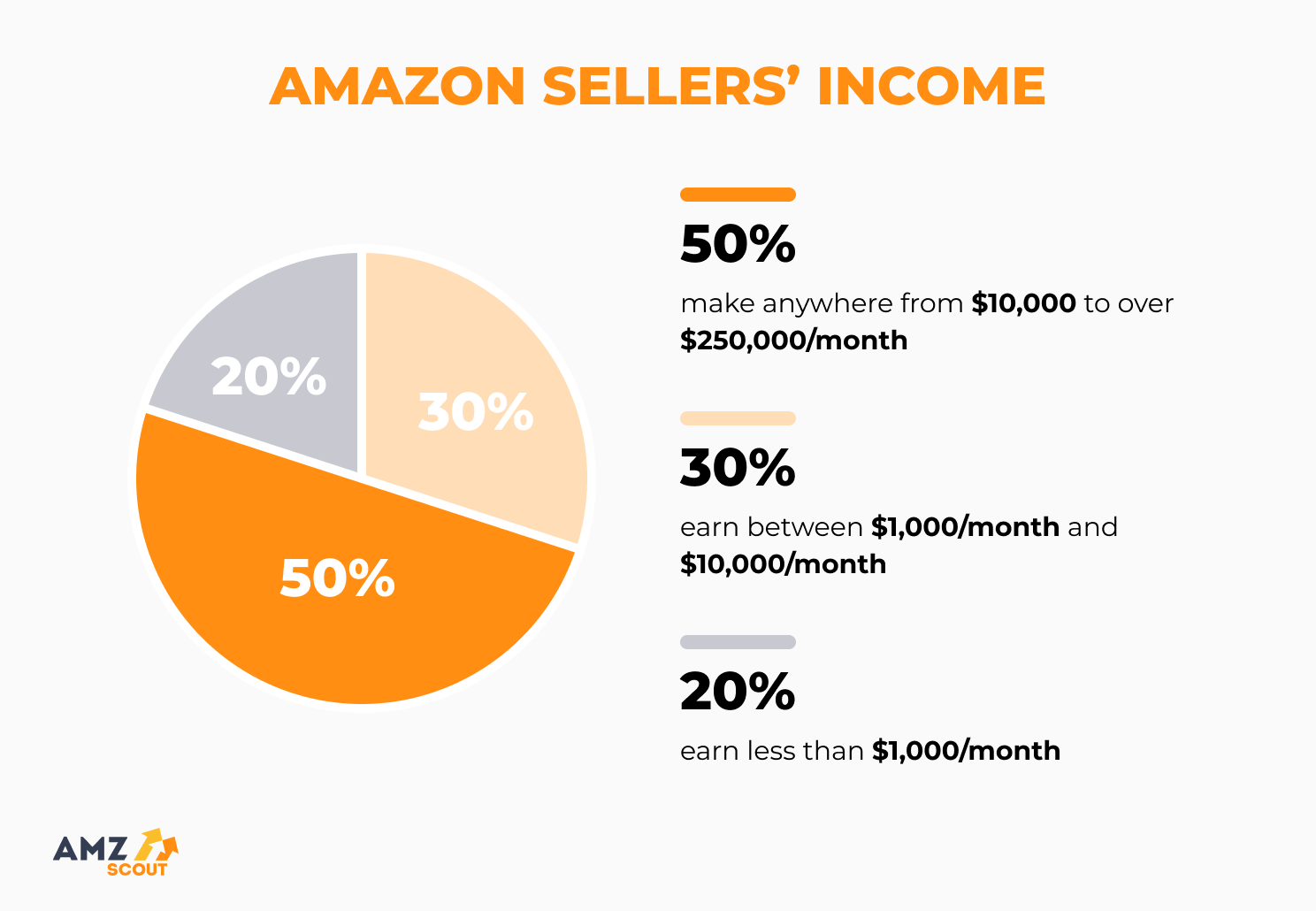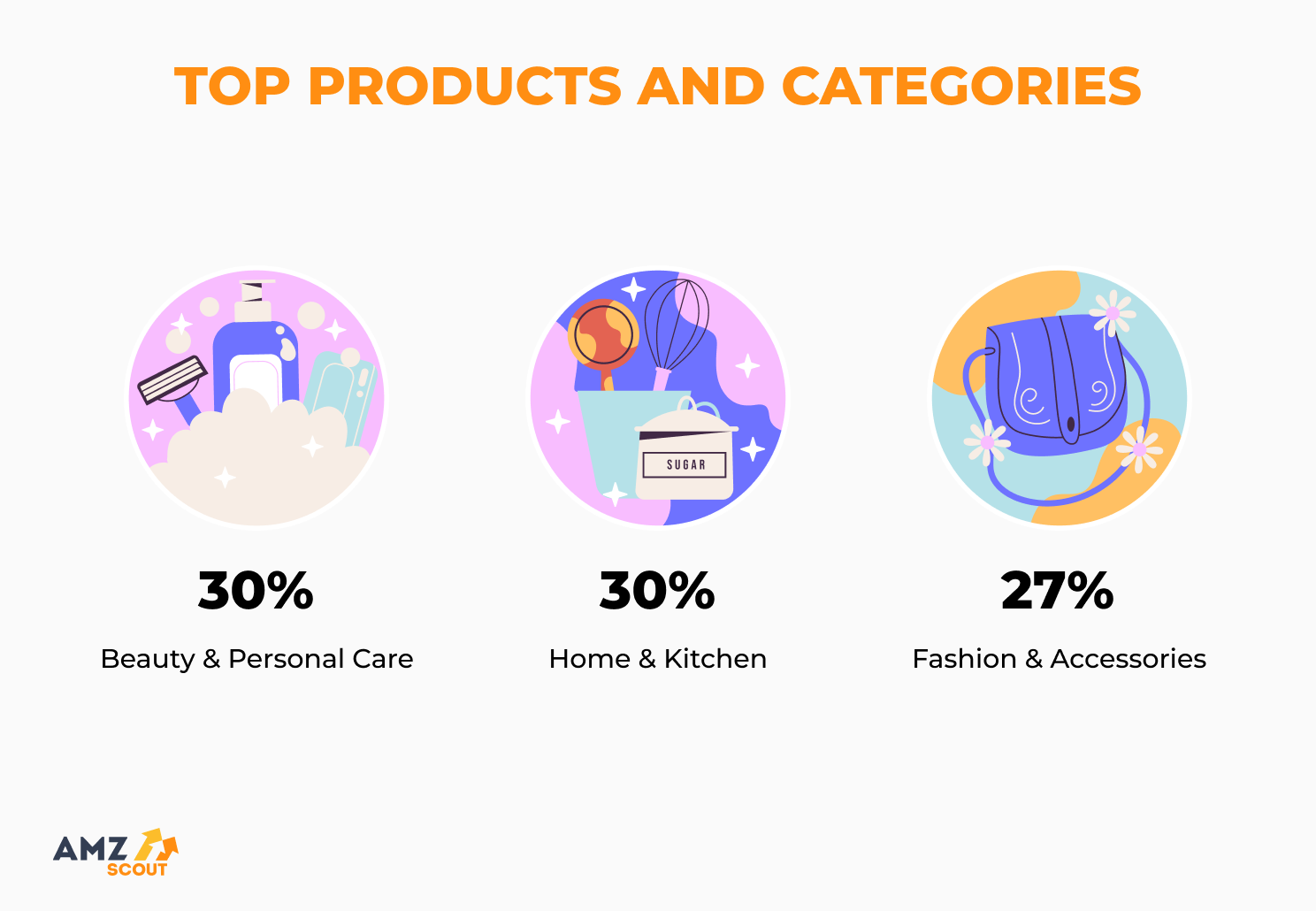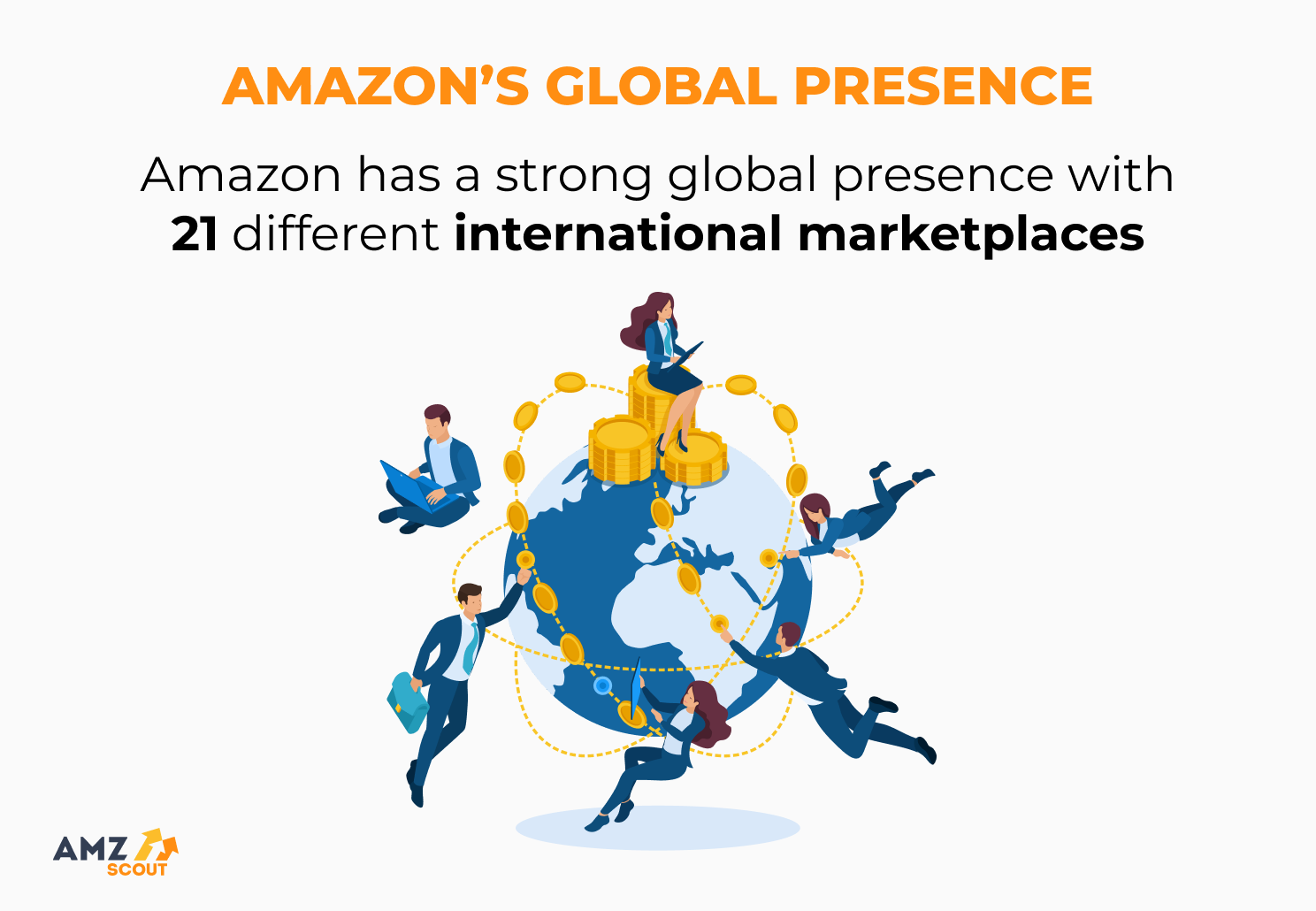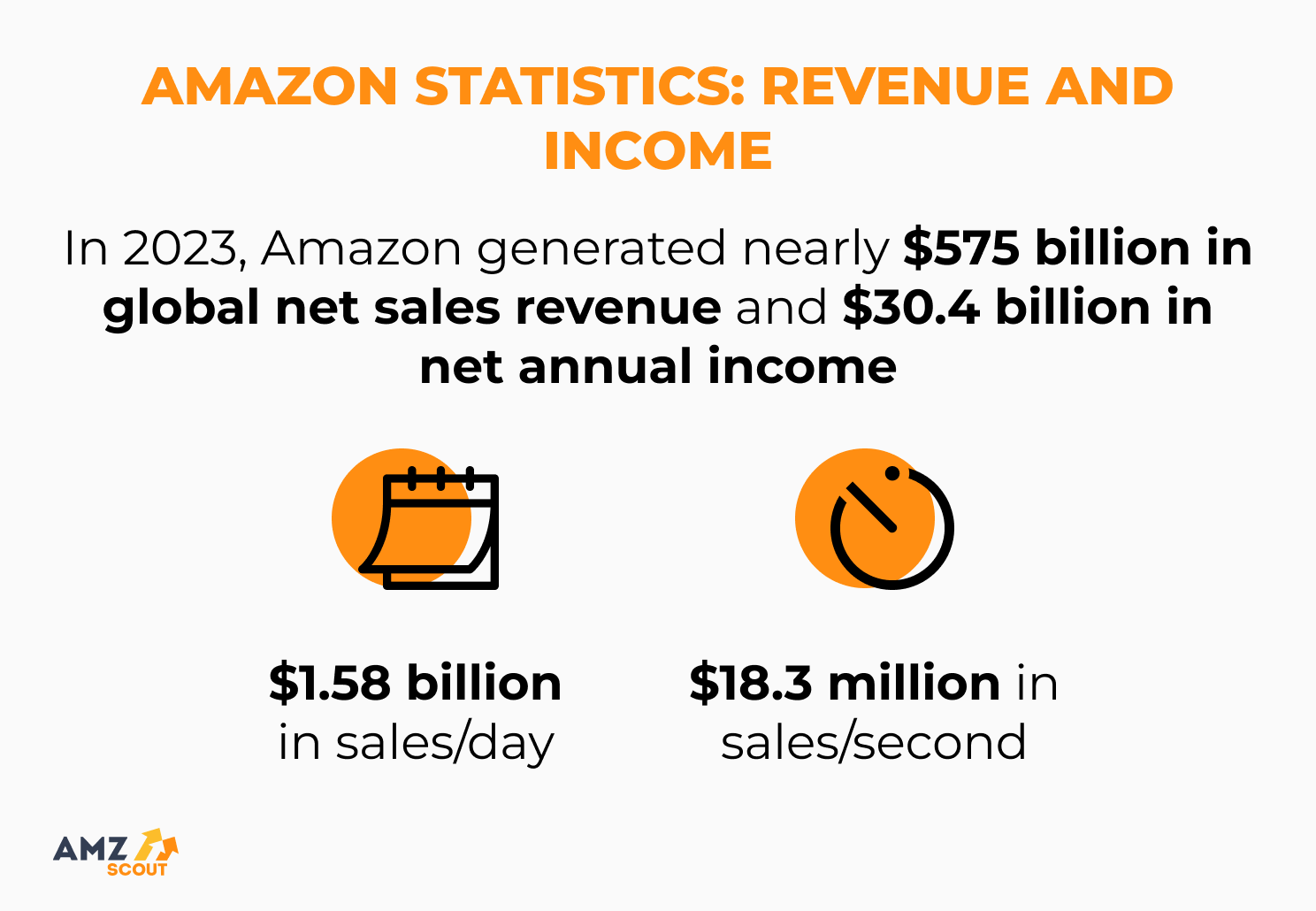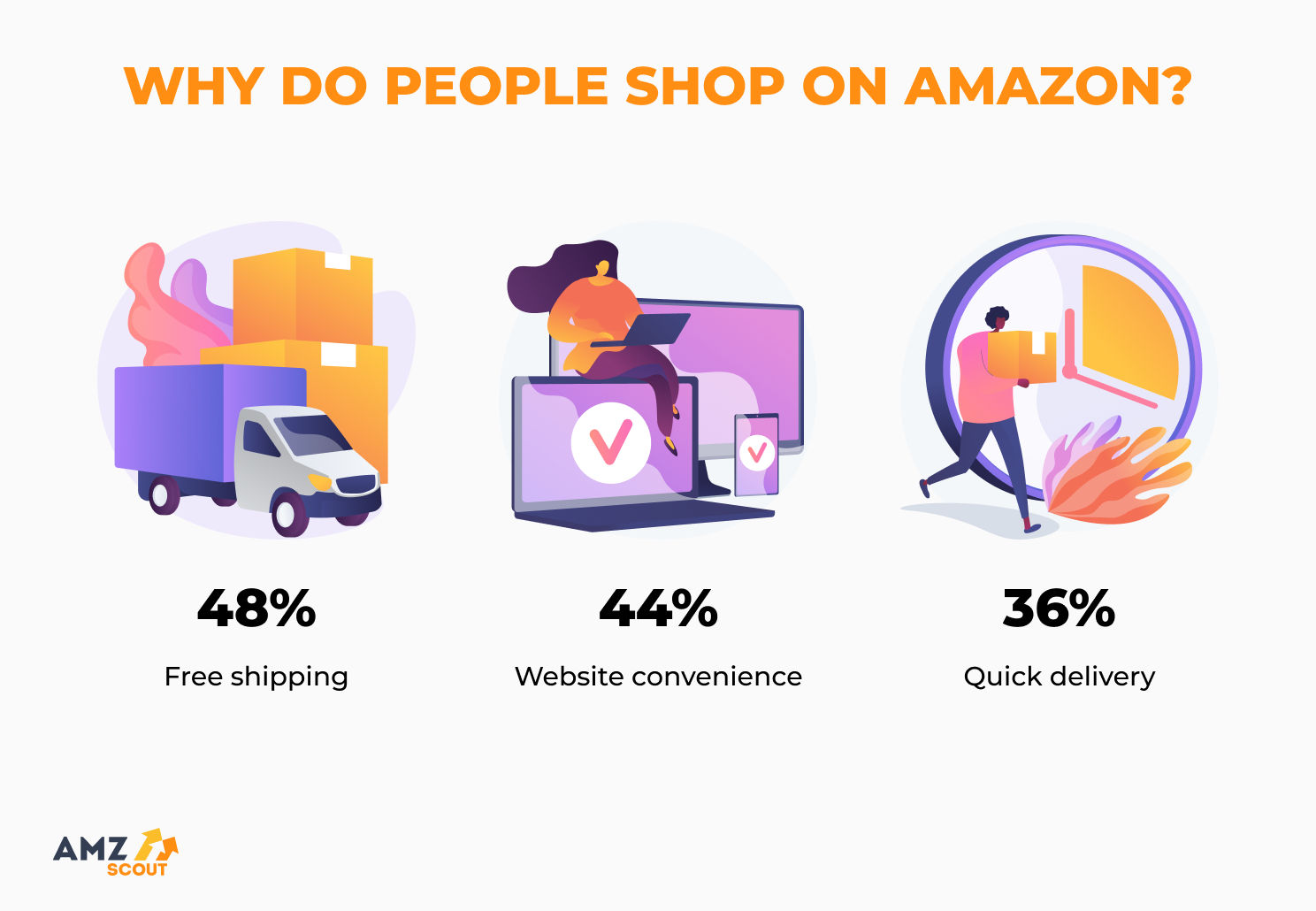
Amazon Statistics: Key Numbers and Fun Facts
We don’t need to tell you that Amazon is popular. Odds are you’re already an Amazon customer, and you may even do a lot of your own shopping through this marketplace.
However, until you see a few key, detailed Amazon Statistics, you may not fully understand just how dominant this company actually is. In this post, we’ll discuss some interesting Amazon stats that illustrate how popular this marketplace is for both customers and sellers, and how it’s only continuing to grow.
1. Amazon Web Traffic
Amazon is one of the most frequently-visited websites in the world, and the fourth most popular site in the United States. It continues to experience remarkable growth, gaining over one billion additional visitors in the past year alone. In June of 2024, Amazon attracted an impressive 3.25 billion visitors (Semrush, 2024).
Notably, over 53% of the website's traffic comes from mobile devices, underscoring the increasing trend of mobile usage among consumers.
2. Number of Amazon Users
Amazon is estimated to have over 310 million active users worldwide. However, it's difficult to determine the precise number of customers at any given time, as Amazon does not release detailed user figures to the public. Furthermore, the number of people using Amazon is increasing consistently, solidifying its status as the most popular marketplace.
In fact, about 80% of these users are from the U.S., accounting for more than 230 million customers. Of these Amazon customers, a significant number have an Amazon Prime membership.
3. Amazon Customer Demographics
Amazon's customer base is diverse, spanning all ages and genders globally. As of June, 2024, over 53% of Amazon customers are male (Similarweb, 2024). In contrast, Walmart (Amazon's main competitor) has nearly 60% female customers.
The largest age group on Amazon is 25-34, comprising nearly 30% of users, followed by the 35-44 demographic. Notably, younger adults aged 18-24 make up the second-largest group of mobile users, with Gen Z users spending an average of one to three hours/week on the platform.
4. Number of Amazon Sellers
While Amazon does provide specific numbers, they do indicate that about one million new sellers join the marketplace annually. Currently, this platform hosts over 9 million sellers, with nearly 2 million actively selling here. However, pinpointing an exact total is challenging, due to the continuously changing number of active sellers.
5. Amazon FBA Sellers
More and more sellers are opting for Amazon's convenient logistics and fulfillment solutions, with FBA adoption reaching 82% in 2024. Notably, more than half of Amazon FBA sellers opt to start their own brands. Private label brands in the Sports & Outdoors, Baby Products, and Beauty & Personal Care categories have shown the strongest performance, with revenue increasing by nearly 0.3% compared to the same period in 2023.
Use Amazon FBA product research software to make it easy to launch your FBA business.


6. Amazon Sellers & AI
AI is becoming part of our daily lives more and more, making everyday tasks and routines easier. Currently, 34% of Amazon sellers use AI to create product listings, and 14% use it for social media content (Statista, 2024).
If you're looking to simplify your business processes and operations, consider trying AI Listing Builder. It crafts compelling SEO-optimized titles, bullet points, and descriptions for your products within a few seconds, helping you attract more customers on Amazon.
7. Number of Products on Amazon
Thousands of different products appear daily on the Amazon platform, so we can only know the approximate number of how many products are on Amazon. According to data gathered in AMZScout’s Product Database from Amazon, there are over 600 million products listed on the marketplace, and 12 million of these items are sold by Amazon itself.
The rest are sold by third-party sellers. This product count also total does not include ebooks, media, and services.
8. Amazon Sales Statistics
With so many users and active subscribers, you may be wondering how many orders does Amazon get each day?
While Amazon doesn’t provide exact order numbers, in 2023 it sold over 4.5 billion items in the U.S. alone. This translates to an average of over 12 million items/day, 8,600 goods/minute and 143 products/second (Amazon, 2024).
At the beginning of 2024, Amazon customers indicated plans to increase their spending on the platform, suggesting expected sales growth for the year.
To check sales for a particular product or track price changes, use the smart tool AMZScout PRO AI Extension.
9. Amazon Sellers’ Income
Have you ever wondered how much money Amazon sellers earn? On average, over 30% of Amazon sellers in the U.S. earn between $1,000/month and $10,000/month. Almost half of sellers make anywhere from $10,000 to over $250,000/month, while the rest earn less than $1,000/month. In fact, in 2023, the average annual sales for U.S. sellers reached $250,000 (Amazon, 2024).
10. Third-Party Seller Statistics
The majority of sales on the Amazon marketplace come from third-party sellers. In Q1 of 2024, these sellers accounted for 61% of all marketplace sales (Marketplace Pulse, 2024). Notably, in the USA, California leads with 77,000 third-party sellers, followed by Florida with 56,000 and Texas with 39,000 (Statista, 2024).
11. Amazon Prime
Many of Amazon’s customers are members of the Amazon Prime program. As a Prime user, you can enjoy a variety of benefits, including free two-day shipping for many items, and access to their streaming video service.
As of 2024, over 200 million people are enrolled in Amazon Prime. It is estimated that the number of U.S. Prime members will reach 180 million by the end of 2024. (Statista, 2024).
12. Top Products and Categories
During the first half of 2024, the highest percentage of the most profitable sellers fall under the following categories:
In the Beauty & Personal Care category, skincare items dominate, accounting for 36% of all sales, with an average price of bestsellers around $13. (Statista, 2024)
Looking ahead, online grocery sales are projected to reach $40.5 billion in 2024, marking a $4 billion increase compared to 2023.
The fastest-growing category is expected to be Fashion & Apparel, which is anticipated to grow by 12.4% by 2027.
13. Amazon’s E-commerce Market Share
Amazon dominates a massive share of the e-commerce market, particularly in the U.S. As of 2023, Amazon held 37.6% of the e-commerce market share in the U.S. (Statista, 2024), and is projected to surpass 40% of U.S. e-commerce sales by 2024.
Globally, Amazon trails behind only Alibaba in market presence. According to Statista forecasts, Amazon is expected to surpass Alibaba by 2027, with estimated annual online sales exceeding $1.2 trillion.


14. Amazon’s Global Presence
Amazon has a strong global presence with 21 different international marketplaces, including a newly launched marketplace in South Africa as of May 2024 (Amazon, 2024). Like the U.S., many of these markets also experience significant traffic. In fact, four of the world's most visited e-commerce websites are Amazon marketplaces.
The largest annual sales are generated by Amazon USA, reaching nearly $400 billion, followed by Germany with approximately $38 billion, and Japan with $26 billion (Statista, 2024). Additionally, Amazon operates in more than 100 countries, and sellers can sell their products in these countries directly, or ship products from other Amazon marketplaces.
15. Influencers & Social Media Impact
Social media's influence is growing across numerous platforms, including Amazon. In 2024, over 55% of Amazon customers admitted that their purchases were influenced by social media influencers.
To capitalize on this trend, Amazon introduced live streaming where customers can engage with influencers in real-time discussions about featured products. Approximately one-fifth of Gen Z users watch these live streams actively.
Among social media platforms, TikTok stands out as exceptionally popular. Nearly half of Amazon Prime members use TikTok, and 72% of Gen Z begin their shopping journey there.
TikTok's influence is profound; products like the Stanley Cup have gone viral and become top sellers on Amazon (Amazon, 2024). According to the AMZScout PRO AI Extension, this item generates a monthly revenue of $2,600,000.
However, while TikTok boosts Amazon sales, it can also divert customers who may prefer to buy directly from brands' own pages rather than through Amazon.
16. Amazon Ads
Amazon ads are renowned for enhancing product visibility significantly and driving sales quickly. In 2023, Amazon reported generating $46.9 billion in revenue worldwide from advertising sales, marking a notable 24% increase from the previous year (Statista, 2024).
Nearly half of Amazon customers have acknowledged purchasing products through Amazon ads.
On average, the cost-per-click (CPC) is $0.95, with an average advertising cost of sales (ACoS) of 30.45%.
17. Amazon Employees
Amazon's vast global presence has naturally resulted in a large workforce. As of Q1 2024, Amazon.com employs 1,521,000 people, not including other markets or subsidiary companies (Statista, 2024). This number reflects a slight decrease from 1,541,000 in 2022.
18. Amazon Logistics
In 2023, Amazon operated over 100 active fulfillment centers in the U.S. and more than 185 centers globally. The company continues to expand, adding 16 million square feet of new centers in the U.S. in 2024. As a result, more than half of Prime member orders now arrive on the same day.
19. Amazon Statistics: Revenue and Income
So with all of these visitors and sales, how much money does Amazon make? Let’s examine some key Amazon revenue and income statistics (Statista, 2024).
In 2023, Amazon generated nearly $575 billion in global net sales revenue and $30.4 billion in net annual income. With that number in mind, we can answer the following questions:
How much does Amazon make in a day? Answer: $1.58 billion in sales/day.
How much does Amazon make per second? Answer: $18.3 million in sales/second.
20. Special Sales Events
Shopping holidays such as Black Friday, Cyber Monday, and Amazon Prime Day are all huge sales drivers for Amazon merchants.
Among these special events, Black Friday stands out for its significant impact on sales. In 2023, Amazon garnered 40% of observed U.S. sales during Black Friday week, up from 37% in 2022. In fact, Amazon customers ordered over 500 million products during this period.
Prime Day also has a substantial influence. On the first day of Prime Day 2024, sales reached $7.2 billion, surpassing the previous year by more than 6.4 billion dollars. Independent sellers sold more than 200 million items during Prime Day, with the total sales for Prime Day 2024 of $14.2 billion.
21. Why Do People Shop on Amazon?
With so much to offer, there are many reasons why people shop on Amazon so frequently. A Statista report (2024) surveyed thousands of customers who listed the following reasons as the most impactful:
Free shipping: 48%
Website convenience: 44%
Quick delivery: 36%
Notably, the percentage of customers who prioritize the best pricing has decreased considerably over the past four years, indicating a shift in shopping priorities.
22. Amazon Innovations and Programs
Beyond its core marketplace operations, Amazon is also renowned for its commitment to sustainability and its investments in cutting-edge technologies, like AI. Amazon offers several AI services designed to help streamline sellers' operations, and continues to expand. In 2024, to further advance safe and responsible AI innovation, Amazon is investing $25 million in a 10-year research collaboration (Amazon, 2024).
AI is already integral to Amazon's daily operations, with over 750,000 robots in its fulfillment centers. They increase efficiency by 75%, enabling Prime customers to receive their orders within one to two days.
Amazon also prioritizes ecological sustainability. In 2023, all of Amazon's energy consumption was matched with renewable sources. Additionally, over 500 companies participate in Amazon's program to achieve zero carbon emissions by 2040 (Amazon, 2024).
23. Fun Facts
Now that we’ve seen these significant Amazon stats, let’s look at some additional interesting facts and frequently asked questions about Amazon and its products.
What is the largest item you can buy on Amazon?
The largest product for sale on Amazon appears to be a mobile house, measuring around 400 sq.ft., with two bedrooms and two bathrooms. The tiny home features a large living room, a fully-equipped kitchen, and spacious bedrooms.
What is the most expensive item you can buy on Amazon?
As of 2024, the most expensive item on Amazon is a $32 million piece of artwork titled "The Way" by Gafur Timeryanov. Notably, this artist is known to be blind and created the painting through tactile sensation with his hands. Check out the other top 10 most expensive items on Amazon here.
Which item has generated the most sales?
This data is not readily available, but according to the AMZScout PRO AI Extension, this iPhone 15 Plus/Pro Max protector currently generates nearly 130,000 sales/month, resulting in almost $880,000 in monthly revenue. Phone cases from this brand for other iPhone models are also in high demand, generating between 40,000 to 70,000 sales per month.
Which item is the most frequently-searched on Amazon?
According to the keyword research tool Ahrefs, the Nintendo Switch is the most highly-searched item, with over 1.3 million searches in the U.S. each month.
Conclusion
These facts about Amazon should put into perspective just how massive this online marketplace is. What’s even more interesting is that their momentum doesn’t seem to be slowing down anytime soon.
While there are still great opportunities for third-party sellers, the market’s growth is also increasing in competition. If you want to gain an edge, you need to utilize strong tools designed to help you find the most profitable opportunities. AMZScout provides just that. Check out our suite of Amazon tools to see how they can help your business grow.




